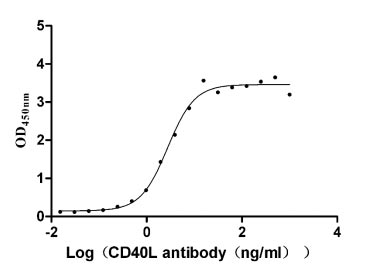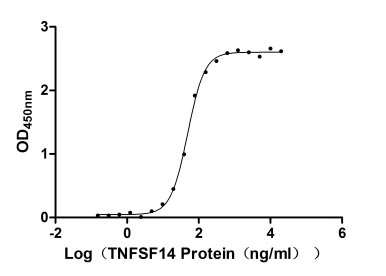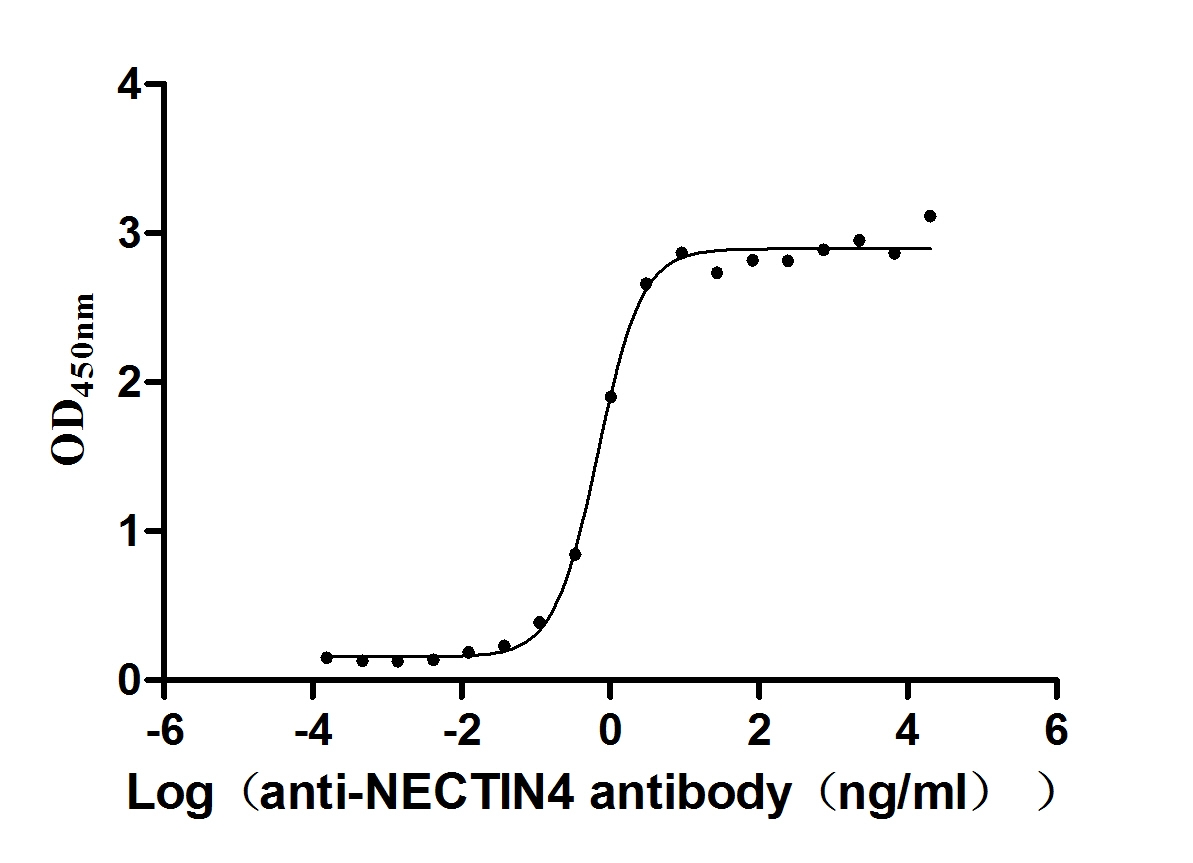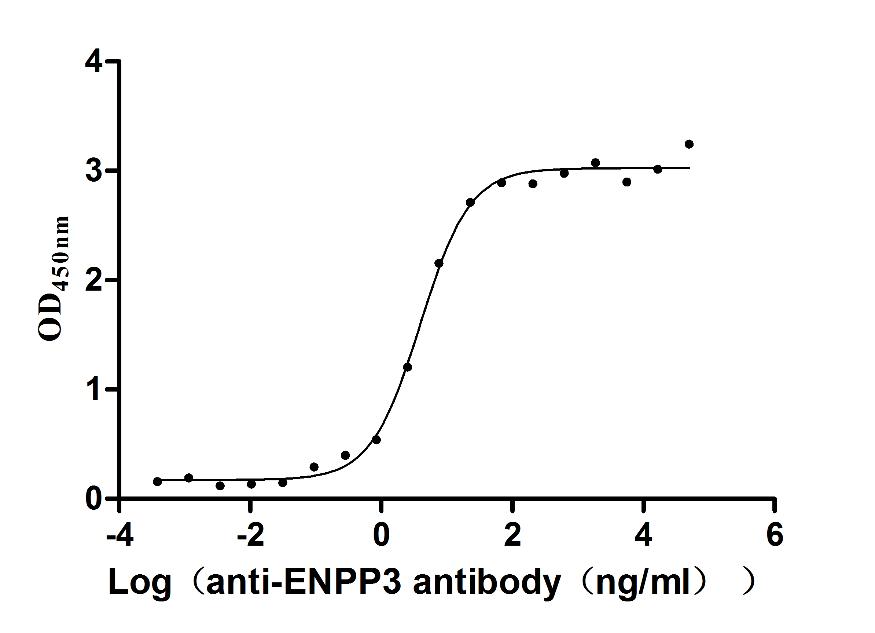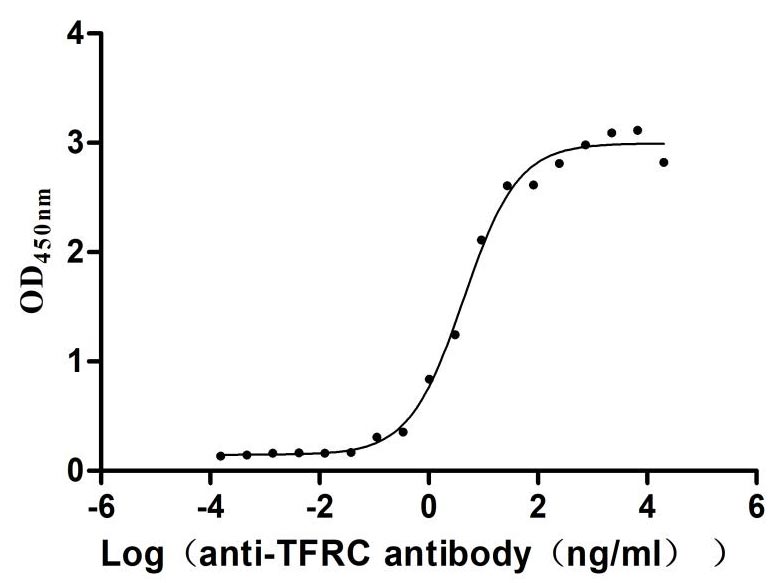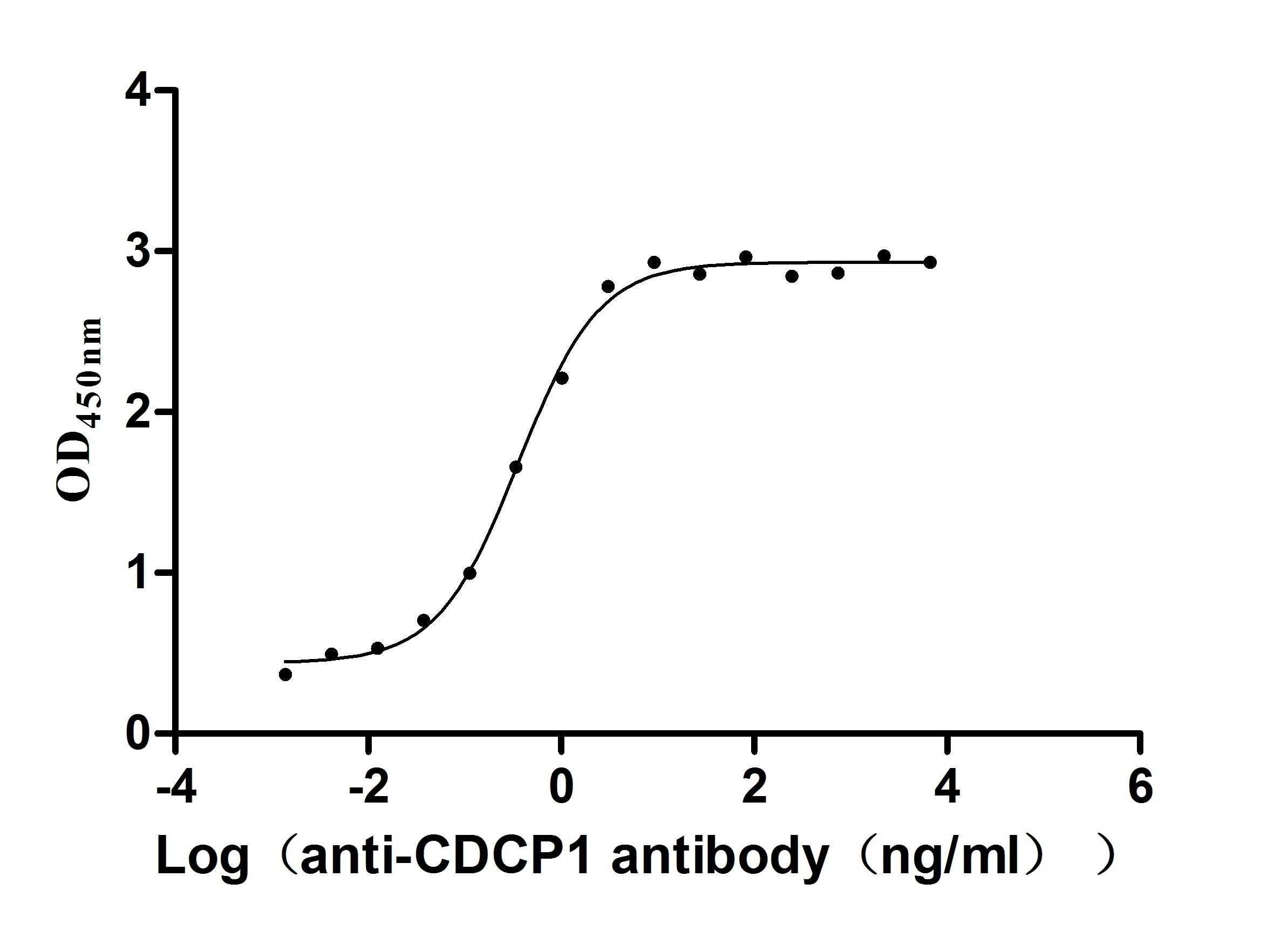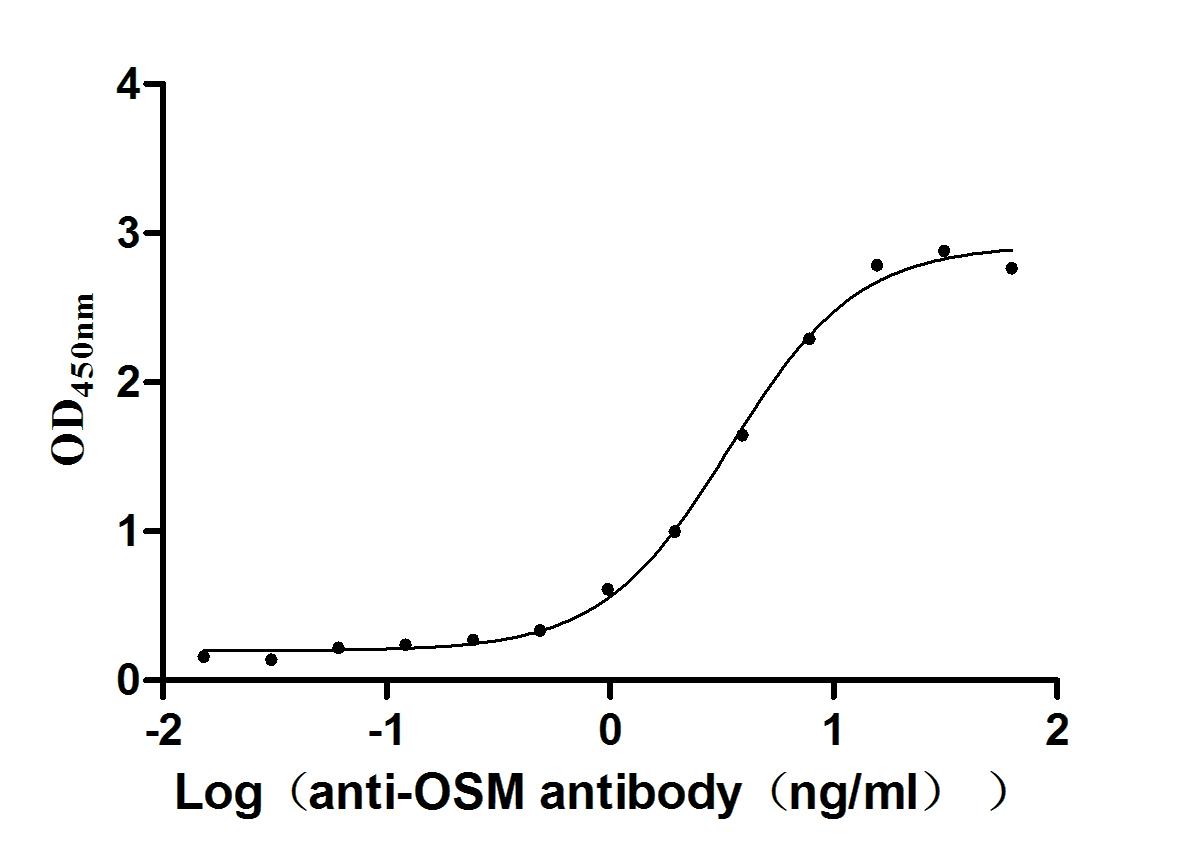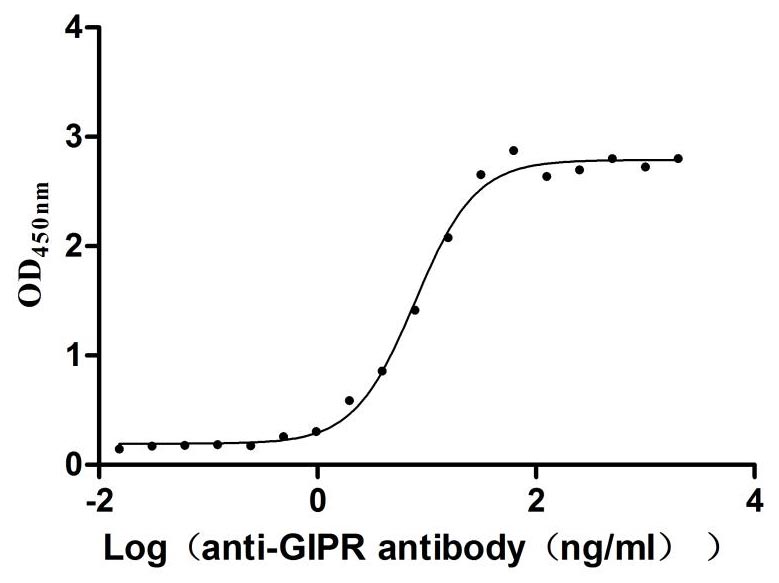Recombinant Mouse 11-beta-hydroxysteroid dehydrogenase 1 (Hsd11b1)
-
中文名称:小鼠Hsd11b1重组蛋白
-
货号:CSB-CF010763MO
-
规格:
-
来源:in vitro E.coli expression system
-
其他:
产品详情
-
基因名:Hsd11b1
-
Uniprot No.:
-
别名:Hsd11b1; Hsd11; Corticosteroid 11-beta-dehydrogenase isozyme 1; 11-beta-hydroxysteroid dehydrogenase 1; 11-DH; 11-beta-HSD1; 11beta-HSD1A
-
种属:Mus musculus (Mouse)
-
蛋白长度:Full Length
-
表达区域:1-292aa
-
氨基酸序列MAVMKNYLLPILVLFLAYYYYSTNEEFRPEMLQGKKVIVTGASKGIGREMAYHLSKMGAHVVLTARSEEGLQKVVSRCLELGAASAHYIAGTMEDMTFAEQFIVKAGKLMGGLDMLILNHITQTSLSLFHDDIHSVRRVMEVNFLSYVVMSTAALPMLKQSNGSIAVISSLAGKMTQPMIAPYSASKFALDGFFSTIRTELYITKVNVSITLCVLGLIDTETAMKEISGIINAQASPKEECALEIIKGTALRKSEVYYDKSPLTPILLGNPGRKIMEFFSLRYYNKDMFVSN
Note: The complete sequence including tag sequence, target protein sequence and linker sequence could be provided upon request. -
蛋白标签:N-terminal 10xHis-tagged
-
产品提供形式:Liquid or Lyophilized powder
Note: We will preferentially ship the format that we have in stock, however, if you have any special requirement for the format, please remark your requirement when placing the order, we will prepare according to your demand. -
缓冲液:Lyophilized from Tris/PBS-based buffer, 6% Trehalose, pH 8.0
-
储存条件:Store at -20°C/-80°C upon receipt, aliquoting is necessary for mutiple use. Avoid repeated freeze-thaw cycles.
-
保质期:The shelf life is related to many factors, storage state, buffer ingredients, storage temperature and the stability of the protein itself.
Generally, the shelf life of liquid form is 6 months at -20°C/-80°C. The shelf life of lyophilized form is 12 months at -20°C/-80°C. -
货期:Basically, we can dispatch the products out in 1-3 working days after receiving your orders. Delivery time may differ from different purchasing way or location, please kindly consult your local distributors for specific delivery time.Note: All of our proteins are default shipped with normal blue ice packs, if you request to ship with dry ice, please communicate with us in advance and extra fees will be charged.
-
注意事项:Repeated freezing and thawing is not recommended. Store working aliquots at 4°C for up to one week.
-
Datasheet & COA:Please contact us to get it.
相关产品
靶点详情
-
功能:Catalyzes reversibly the conversion of cortisol to the inactive metabolite cortisone. Catalyzes reversibly the conversion of 7-ketocholesterol to 7-beta-hydroxycholesterol. In intact cells, the reaction runs only in one direction, from 7-ketocholesterol to 7-beta-hydroxycholesterol.
-
基因功能参考文献:
- exercise training increases pulmonary expression of 11beta-HSD1, thus contributing to local glucocorticoid activation and suppression of pulmonary inflammation in obese mice PMID: 28663379
- study demonstrates that glucocorticoid-induced insulin resistance was dependent on 11beta-HSD1, resulting in the critical activation of JNK signaling in adipocytes. PMID: 27841334
- findings indicate that 11b-HSD1 regenerated glucocorticoids in the forebrain and decreased levels of Brain Derived Neurotrophic Factor in the hippocampus play a role in spatial memory deficits in aged wild-type mice. PMID: 27859809
- 11beta-HSD1 protein expression after caloric restriction was significantly up-regulated, while no difference was detected after re-feeding. Interestingly, upregulation of protein after CR (1.4-fold) was lower than the increase in enzymatic activity (2.6-fold). PMID: 28254522
- The present study shows the temporal localisation of 11beta-HSD1 in uterus, highlighting its importance in the timing of gestation and suggesting its contribution in the myometrium contraction. PMID: 28237720
- 11beta-HSD1 deficiency in myeloid phagocytes promotes angiogenesis. PMID: 28676523
- These data identify suppression of CXCL2 and CXCL5 chemoattractant expression by 11beta-HSD1 as a novel mechanism with potential for regulation of neutrophil recruitment to the injured myocardium, and cardiac fibroblasts as a key site for intracellular glucocorticoid regeneration during acute inflammation following myocardial injury. PMID: 28522730
- Brown adipose tissue (BAT) from aged 11beta-HSD1 KO mice showed elevated UCP1 protein and mitochondrial content, and a favorable profile of BAT function. PMID: 28368470
- 11beta-HSD1-deficient mice are not protected from metabolic disease or hepatosteatosis in the face of a nonalcoholic fatty liver disease-inducing diet. PMID: 27384305
- 11beta-Hydroxysteroid dehydrogenase type 1 within muscle protects against the adverse effects of local inflammation. PMID: 27578244
- these data suggest that corticosterone activation by 11beta-HSD1 in keratinocytes suppresses hapten-induced irritant dermatitis through suppression of expression of cytokines PMID: 27070821
- Nr3c2 has a role in mouse skin development in a process that involves HSD11B1/HSD11B2 PMID: 26268211
- Loss of 11beta-HSD1 is associated with hepatocellular carcinoma. PMID: 26700460
- Data (including data from knockout mice studies) suggest expression of 11bHSD1 (in cardiomyocytes, vascular smooth muscle, other cells) promotes infarct expansion/ventricular remodeling after myocardial infarction & limits angiogenesis/infarct repair. PMID: 26465199
- Our results demonstrate an inhibitory effect of IGF-I on 11beta-HSD1 expression and activity within the pancreatic islets, which may mediate part of the IGF-I effects on cell proliferation, survival and insulin secretion PMID: 26305481
- elevated in livers of offspring of restraint-stressed mothers PMID: 25708481
- Data indicate that 11beta-HSD1 activity contributes substantially to diurnal and stress-induced increases in hippocampal CORT levels. PMID: 25614240
- Dynamic increases in hippocampal 11b-HSD1 regenerated CORT levels during learning and retrieval play a key role in age- and stress-associated impairments of spatial memory. PMID: 25109766
- Data suggest that Hsd11b1 expression is up-regulated in white adipose tissues of obese mice; this induction of Hsd11b1 appears to reduce mitochondrial respiration and adiponectin synthesis in hypertrophic adipocytes. PMID: 25869616
- Data suggest that Gh (growth hormone) represses H6pd (hexose-6-phosphate dehydrogenase) through locally produced Igf1 (insulin-like growth factor 1); Gh directly represses Hsd11b1 mRNA rather than acting via Igf1 receptor. PMID: 24759003
- Elevated adipose 11beta-HSD1 expression may contribute to glucocorticoid-induced insulin resistance and adipolysis. PMID: 25389364
- 11beta-HSD1, particularly in adipose tissue, is key to the development of the adverse metabolic profile associated with circulating glucocorticoid excess PMID: 24889609
- The possibility of a vicious circle of glucocorticoids signals via 11beta-HSD1 up-regulation in adipose tissues, contributing to deterioration of glucose metabolism to result in diabetes. PMID: 24511146
- Elevated hepatic 11betaHSD1 is an important contributor to early insulin resistance and dyslipidemia in uremia. PMID: 24569863
- TNFalpha-mediated Hsd11b1 binding of NF-kappaB p65 is associated with suppression of 11beta-HSD1 in muscle cells. PMID: 24413279
- Oxidoreduction of 7-oxolithocholic acid and its conjugated metabolites are catalyzed by 11beta-HSD1. PMID: 23933573
- These data challenge the concept that inhibition of 11beta-HSD1 is likely to produce a "step-change" treatment for diabetes and/or obesity. PMID: 24169553
- 11beta-HSD1 expression is down-regulated during adipose tissue expansion in diet-induced obese mice. PMID: 23512810
- 11beta-HSD1 can inter-convert 7-KC and 7betaOHC in the arterial wall PMID: 22940536
- 11beta-HSD1 expression was decreased in TPA-treated hyperproliferative skin. PMID: 23362866
- 11beta-hydroxysteroid dehydrogenase type 1 gene knockout attenuates atherosclerosis and in vivo foam cell formation in hyperlipidemic apoE knockout mice. PMID: 23383297
- These findings suggest that 11b-HSD1-generated glucocorticoids may tonically restrain mast cell degranulation, potentially influencing allergic, anaphylactic and inflammatory responses. PMID: 23349944
- 11beta-HSD1 inhibition reduces atherosclerosis in mice by altering proinflammatory gene expression in the vasculature. PMID: 23170035
- Our results indicate that 11beta-HSD1 acts as a vital regulator that controls the expression of genes related to brown fat function and as such may become a potential target in preventing obesity PMID: 23197361
- Ifi202b modulates fat accumulation through expression of adipogenic genes such as 11beta-Hsd1. PMID: 22692684
- 11beta-HSD1 may be a very promising therapeutic target for obesity and associated disease. PMID: 22768329
- mice with liver-specific disruption of 11beta-hydroxysteroid dehydrogenase type 1 lack significant metabolic abnormalities PMID: 22555437
- High-fat diet accelerated aging in the liver of SAMP10 mice by increasing liver mRNA level for Hsd11b1, increasing insulin secretion, and promoting lipid accumulation in the liver. PMID: 22033707
- knockdown of 11beta-HSD1 can protect against several western type diet-induced metabolic abnormalities. These effects are, at least in part, mediated by increases in the oxidative capacity of brown adipose tissue. PMID: 22209663
- These studies delineate a novel pathway that links hormonal and circadian signals to gluconeogenesis and glucose homeostasis. PMID: 22447855
- Reduced intra-adipose glucocorticoid regeneration by 11beta-HSD1 is a novel mechanism that contributes to the metabolic efficacy of salicylates. PMID: 22357964
- Optimal elevation of beta-cell 11beta-HSD1 represents a novel biological mechanism supporting compensatory insulin hypersecretion rather than exacerbating metabolic disease. PMID: 22315313
- adipose tissues of 11betaHSD1(-/-) mice exhibit attenuated hypoxia, induction of hypoxia-inducible factor (HIF-1alpha) activation of the TGF-beta/Smad3/alpha-smooth muscle actin (alpha-SMA) signaling pathway, and fibrogenesis PMID: 22158867
- 11beta-HSD1-deficient mice showed greater numbers of inflammatory cells in pleural lavages in carrageenan-induced pleurisy with lung pathology consistent with slower resolution, suggesting that 11beta-HSD1 limits acute inflammation. PMID: 22067318
- tissue- and differentiation state-specific promoter usage in expression of human HSD11B PMID: 21215738
- 11beta-HSD1 controls glucocorticoid-induced protein degradation in human and murine skeletal muscle via regulation of the E3 ubiquitin ligases Atrogin-1 and MuRF-1. PMID: 21304964
- 11beta-HSD1 deficiency in aging mice leads to lower intracellular GC concentrations in brain, particularly in the hippocampus, which activate predominantly MRs to enhance memory PMID: 21411659
- Demonstrated that remarkable pharmacokinetic differences existed between high-fat diet-induced obese and lean mice for HSD11B1 inhibitors. PMID: 21198436
- These data are consistent with an 11beta-HSD1-independent function for H6PDH in which sarcoplasmic reticulum G6P metabolism and NAD/NADH redox status are important for maintaining muscle homeostasis. PMID: 21106871
- Inflammatory cell recruitment after myocardial infarction is modified in mice deficient in 11bHSD1 and this provides an enhanced stimulus for angiogenesis in the healing infarcts of these mice. PMID: 20495186
收起更多
-
亚细胞定位:Endoplasmic reticulum membrane; Single-pass type II membrane protein.
-
蛋白家族:Short-chain dehydrogenases/reductases (SDR) family
-
组织特异性:Widely expressed. Highest expression in liver.
-
数据库链接:
KEGG: mmu:15483
STRING: 10090.ENSMUSP00000016338
UniGene: Mm.28328


